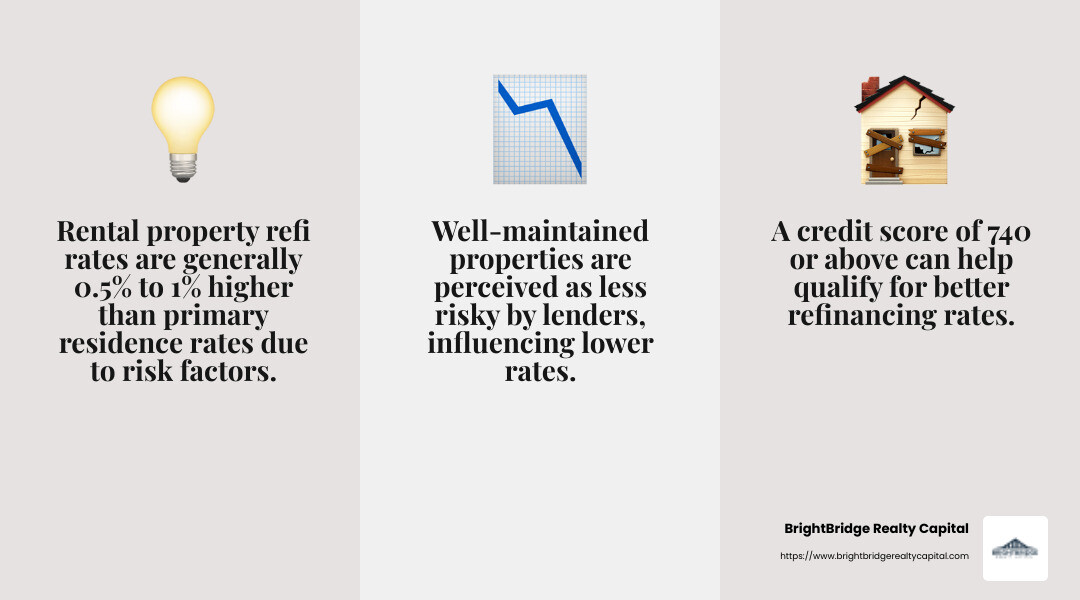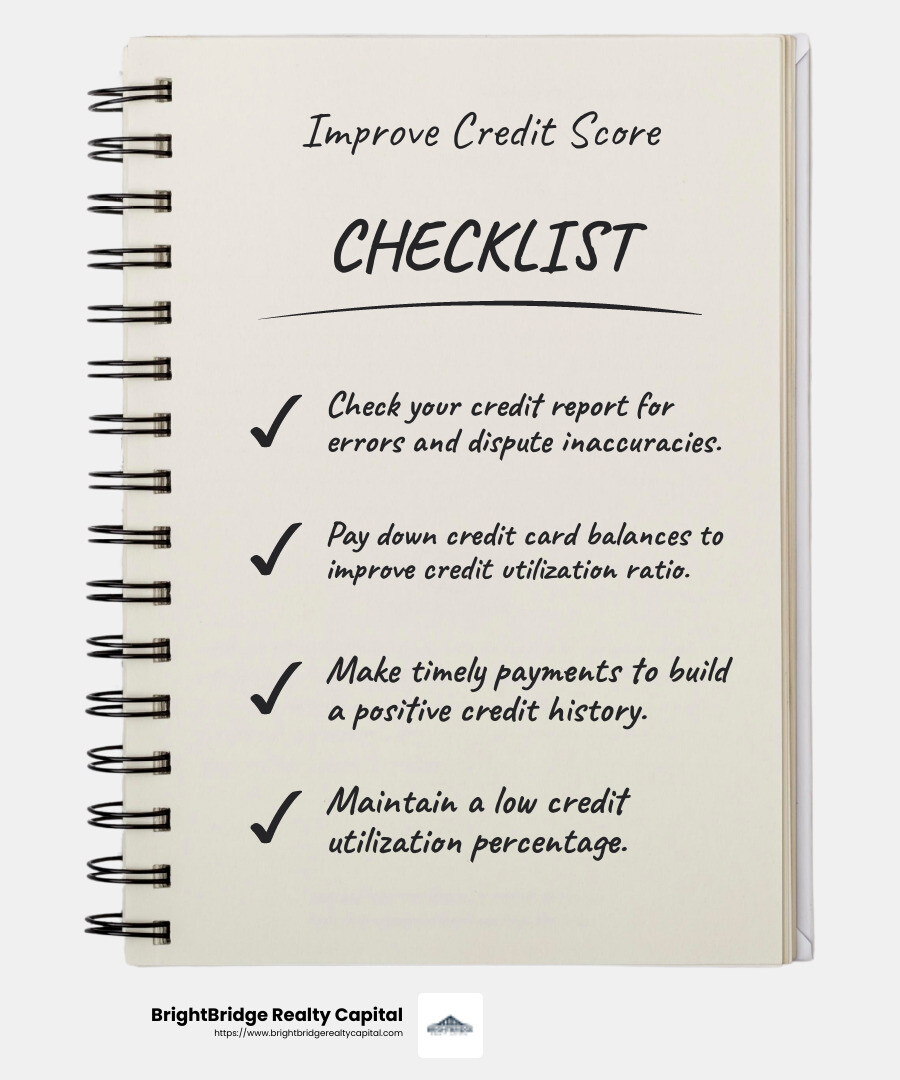Rental Property Refi: How to Lock in the Best Rates

Refi rate for rental property is a key concern for many real estate investors seeking to optimize their holdings and gain financial flexibility. Whether you're building long-term wealth or looking to improve cash flow, understanding and securing the best refinancing rates for your rental property is crucial.
- Primary Query Answer: The refi rate for rental property is typically higher than that for primary residences, often by 0.5 to 1 percentage point.
Investment properties are viewed as riskier by lenders, influencing these higher rates. As a savvy investor, grasp these dynamics when considering refinancing options. Navigating the mortgage landscape to lock in the best possible rates—not just for potential cost savings, but also to afford greater flexibility in expanding your real estate portfolio—requires some knowledge and strategy.
In this guide, you'll uncover the essentials of navigating refi rates for your rental property, empowering you to make informed decisions that align with your investment goals.

Refi rate for rental property terms at a glance:
- 30 year rental property loans
- conventional mortgage rates investment property
- refinancing primary residence to investment property
Understanding Refi Rates for Rental Property
When refinancing a rental property, the refi rate is often higher than for a primary residence. This is because lenders see rental properties as riskier investments. They may charge 0.5 to 1 percentage point more in interest.
Why Are Refi Rates Higher for Rental Properties?
Risk Factors: Lenders worry about rental income stability. If tenants don't pay rent, you might struggle to make mortgage payments. This potential risk leads to higher rates.
Additionally, economic factors like the 10-year Treasury yield and investor demand influence rates. Lenders add a "risk cushion" to protect against potential losses. This cushion varies by your financial profile. If you have a lower credit score or more debt, expect a higher rate.
What Influences Your Refi Rate?
Several factors can affect the rate you receive:
- Credit Score: A higher score can mean better rates. Aim for 740 or above to qualify for the best offers.
- Debt-to-Income Ratio: Lowering your debt compared to your income can improve your rate.
- Property Condition: Well-maintained properties are less risky for lenders.

Understanding these elements helps you prepare and potentially lower your refi rate for rental property. By managing your credit, debt, and property condition, you can position yourself for better refinancing terms.
Steps to Secure the Best Refi Rate
Refinancing a rental property can be a smart move, but securing the best refi rate requires careful planning and attention to detail. Follow these steps to position yourself for the most favorable terms.
1. Gather Your Paperwork
Start by organizing all necessary documents. You'll need:
- Proof of Income: Recent pay stubs, tax returns, and any additional income sources.
- Property Details: Information about the rental property, including its value and any current loans.
- Credit Information: A current credit report to understand your score and history.
Having these documents ready will streamline the application process and demonstrate your preparedness to lenders.
2. Submit Your Application
Once your paperwork is in order, it's time to apply. Consider submitting applications to multiple lenders to compare offers. Each lender may have different criteria and rates, so shopping around can yield better options.
3. Lock in Your Rate
After receiving offers, you can lock in a rate. This guarantees your interest rate for a set period, protecting you from potential rate increases during the refinancing process. Be sure to ask each lender about their rate lock policies and any associated fees.
4. Undergo Underwriting
The underwriting process involves a thorough review of your financial situation and the rental property's value. Lenders will assess your ability to repay the loan based on your credit score, debt-to-income ratio, and property condition.
- Tip: Ensure your property is in good condition before the appraisal, as this can influence the loan amount and terms.
5. Closing the Deal
Finally, you'll reach the closing stage. Here, you'll sign the final paperwork and pay any closing costs. This step finalizes the refinancing, and you'll begin making payments under the new loan terms.
- Pro Tip: Review the closing documents carefully to understand all terms and fees.
By following these steps, you can steer the refinancing process with confidence and secure the best possible refi rate for rental property. This sets the stage for potential savings and improved financial stability.
Factors Affecting Refi Rates
Refinancing your rental property can be a great way to save money, but there are several factors that can affect the refi rate you receive. Understanding these can help you prepare and potentially secure better terms.
Financial Hardship
Lenders are cautious when they see signs of financial hardship. If you've faced issues like missed payments or bankruptcy, it could lead to higher interest rates. Lenders view these as red flags, indicating a higher risk of default.
Tip: If you've had financial difficulties in the past, work on improving your credit score and reducing debt before applying for a refi.
Tenant Issues
Your relationship with tenants can also impact your refi rate. Regular rental income assures lenders of your property's profitability. However, if there are issues like frequent late payments or tenant turnover, it can make lenders wary. They might see this as a sign that your rental property isn't a reliable income source.
Tip: Maintain good communication with tenants and address issues promptly to ensure steady rental income.
Vacancy
Vacancy is another critical factor. A vacant property doesn't generate income, making it riskier for lenders. If your property has been empty for long periods, it could lead to a higher refi rate. Lenders want assurance that your property will continue to generate income to cover the loan.
Tip: Implement strategies to reduce vacancy, such as competitive pricing and effective marketing, to keep your property occupied.
Lender Risk
Lenders adjust rates based on perceived risk. For rental properties, this risk is typically higher than for primary residences. The possibility of vacancy, tenant issues, and financial hardship all contribute to this perception. As a result, lenders might charge higher rates to compensate for the increased risk.
Tip: Strengthen your financial profile by maintaining a high credit score and a low debt-to-income ratio. This can help mitigate the risk in the eyes of lenders.
By understanding these factors, you can take proactive steps to address potential issues and position yourself for a more favorable refi rate for rental property. This awareness can lead to significant savings over the life of your loan and help ensure the financial success of your investment.
Tips to Lower Your Refi Rate
When refinancing a rental property, getting the best possible rate can save you a lot of money. Here are some practical tips to help you secure a lower refi rate for rental property:
Boost Your Credit Score
A higher credit score can significantly impact the interest rate you receive. Lenders prefer borrowers with strong credit histories, as they are seen as less risky.
- Check Your Credit Report: Look for errors and dispute any inaccuracies.
- Pay Down Debt: Reduce your credit card balances to improve your credit utilization ratio.
- Make Timely Payments: Consistently pay bills on time to build a positive credit history.

Optimize Your Loan-to-Value Ratio
The loan-to-value (LTV) ratio is a measure of how much you owe on your mortgage compared to the property's current value. A lower LTV can lead to better rates.
- Increase Equity: Consider making a larger down payment or paying off more of your existing mortgage.
- Property Valuation: Get an accurate appraisal to ensure your property's value is correctly assessed.
Maintain Property Condition
The condition of your rental property can also influence your refi rate. Well-maintained properties are less risky for lenders.
- Regular Maintenance: Keep up with repairs and maintenance to ensure your property remains in good condition.
- Curb Appeal: Investing in improvements that improve the property's appearance can boost its value.
By focusing on these areas, you can improve your chances of securing a favorable refi rate for rental property. This can lead to lower monthly payments and greater long-term savings.
Next, let's explore some common questions about refi rates for rental properties.
Frequently Asked Questions about Refi Rates
What is the typical range for refi rates on rental properties?
Refinancing a rental property usually comes with higher interest rates compared to primary residences. Typically, refi rates for rental properties are about 0.25 to 0.75 percentage points higher. This is because lenders perceive rental properties as riskier investments. If tenants don’t pay rent or the property sits vacant, the owner might struggle with payments. Therefore, lenders charge more to offset these risks.
How do investment property rates compare to primary residence rates?
Investment property rates are generally higher than those for primary residences. For primary residences, lenders offer lower rates since they assume homeowners will prioritize payments to keep their homes. In contrast, investment properties are seen as less essential, leading to higher default risks. As a result, the interest rates for investment properties often exceed those of primary residences by 0.25 to 0.75 percentage points.
Can government-backed loans be used for rental property refinancing?
Government-backed loans like FHA and VA loans are typically reserved for primary residences. These loans offer benefits like lower down payments and competitive interest rates but are not available for purchasing or refinancing rental properties. However, if you initially financed your primary residence with an FHA or VA loan and later converted it into a rental property, you might be eligible for certain streamline refinance programs. These programs allow you to refinance your loan without the need for a full credit check or appraisal, but they are limited to existing FHA or VA loans.
By understanding these aspects, you can better steer the refinancing landscape and make informed decisions about your rental property investments.
Conclusion
Refinancing a rental property can be a strategic move to improve cash flow and secure better terms. At BrightBridge Realty Capital, we specialize in providing custom financing solutions that meet the unique needs of real estate investors. Our commitment to fast closings—often within a week—ensures you can seize investment opportunities without delay.
We understand that every investor's strategy is different. That's why we offer customized financing options to help you achieve your specific goals, whether you're looking to lower your interest rate, access equity, or consolidate debt. Our direct lending approach eliminates intermediaries, allowing us to offer competitive rates and a seamless process from start to finish.
If you're ready to take the next step in refinancing your rental property, explore our services and see how we can help you lock in the best rates. Learn more about our quick and flexible funding options here.
With BrightBridge Realty Capital, you're not just getting a loan—you're gaining a partner dedicated to your investment success.


